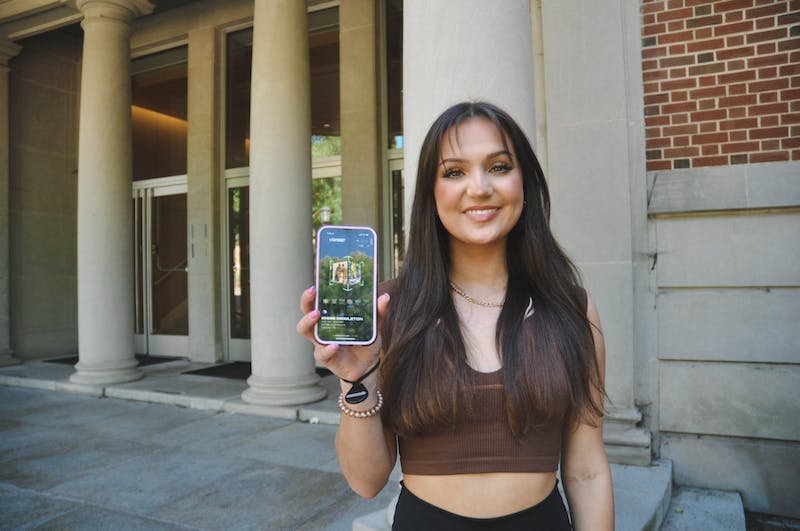Megan Tezzi, a sophomore business and computer science major, poses on campus on Wednesday, Sept. 21, 2022, with an NFT that she made. “Everyone was telling me that I’m wasting my money and never going to get the money back… Then, almost two years into having an account, I’ve actually made a decent amount of money.”
Twitter is adorned with cartoon apes and penguins — non-fungible tokens (NFTs) that have risen to the surface of cryptocurrency.
For some, they have stirred curiosity. For some, confusion. For others, they have been a source of profit. Now, some UNC students are cashing in on the deal as NFTs grow in popularity.
NFTs are units of value stored on a blockchain, a digital database, that serve as unique and uncopyable files. They’re designed to increase the value of digital files by making them scarce.
Nick Gargano, a sophomore pre-business major, said he has not personally been involved with creating them but has experience buying and selling NFTs.
“It’s kind of like an online collectible,” he said. “It’s like assigning a signature to a digital item like a photo or really anything. It could just be attached to anything and make it more unique.”
NFTs are operated as cryptocurrency and people need a digital wallet, compared to a folder, to store items. NFTs drop similarly to physical marketplace debuts — customers must be on the trading platform when an NFT debuts to obtain one before supply runs out.
This is called minting, which creates the NFT and files it into wallets, allowing people to hold on to it or sell it at other marketplaces, Gargano said.
Gargano said certain NFT collections have benefits and online perks, specifically Bored Ape Yacht Club, where many celebrities purchase Twitter profile pictures.
“A lot of those are very hype-driven, especially being limited,” he said. “That’s also kind of a con of them. You can build hype around it and then once it dies, they can become worthless.”
Megan Tezzi, a sophomore business and computer science major and the director of digital marketing of the UNC Undergraduate Business Technology Club, said she started collecting NFTs when they first started taking off during the pandemic.
“COVID was when everything started becoming more digitalized. And with NFTs, you were able to collect digital assets that were almost real-world assets,” she said. “And then with buying, selling and trading, the collectibles became contactless and way more efficient than using a physical item.”
Tezzi trades on NFT platforms like NBA Top Shot and NFL All Day, which let people collect “one-of-a-kind moments” instead of physical sports cards.
She said these moments are completely unique and can’t be replicated, as only a limited amount of people can own a specific NFT.
Esey Haile, a first-year neuroscience major, said he made over $1,000 off NFTs and has been in several projects, including Crypto Coral Tribe, an NFT collection based on conserving marine life.
One reason Haile said he got into NFTs is because he wanted to be ahead of the curve and knew there would be big profits as the internet decentralizes. NFTs thus create a platform where digital creators — whether musical or visual — can get more profit out of their work than they could on a major digital platform like Spotify.
“It’s like a personal keepsake that you could also make money from. It was no different to me — I really like shoes,” Haile said. “It was no different to me than buying and selling shoes.”
@dailytarheel
[email protected]
To get the day’s news and headlines in your inbox each morning, sign up for our email newsletters.

